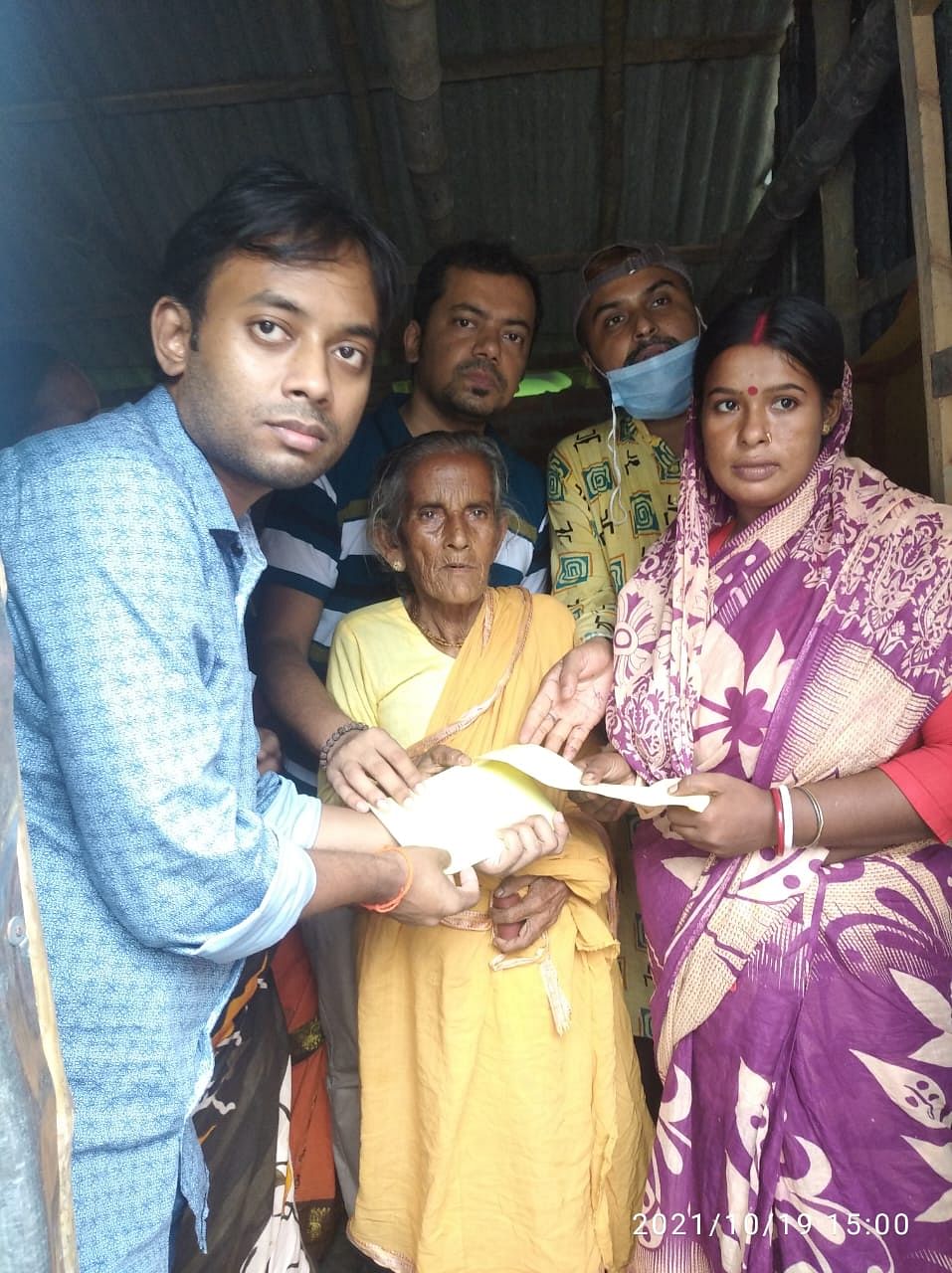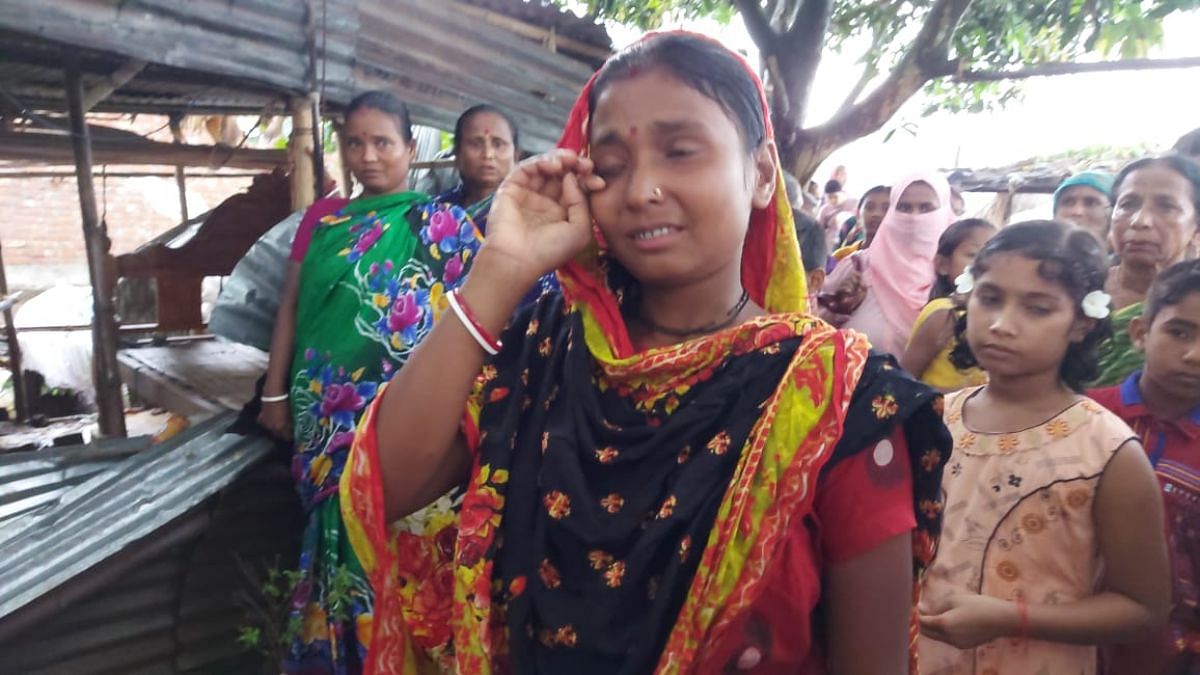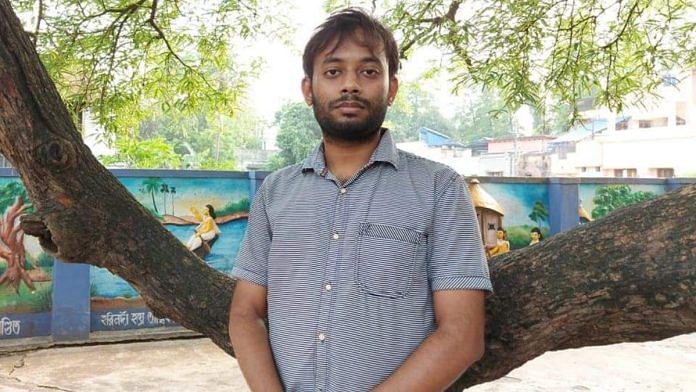New Delhi: This year, Durga Puja did not bring joy to Joyanta Karmoker. As neighbourhood Hindus came to wish him Shubho Bijoya and his social media filled with greetings, the 27-year-old activist recounts the attacks on Durga idols and puja pandals across Bangladesh. The ruling party Awami League, however, has gone to town claiming it was all peaceful this year.
Between these competing claims hangs Bangladesh’s fragile social peace where the Hindu minority has been increasingly pushed into a corner of low expectations and gratitude in recent years. It’s in these times that Karmoker looks at Indian Prime Minister Narendra Modi with hope and admiration. He is one of Bangladesh’s biggest Modi fans and a chronicler of injustices.
“Hindus were not killed this year during Durga Puja. Nor did murderous Islamist mobs attack puja pandals in front of TV cameras. But hate has been so normalised that we ignore the fact that in several villages and towns, Durga idols were broken. A man was caught red-handed trying to put copies of the Quran inside puja pandals and create a situation like 2021,” the Hindu rights activist tells ThePrint over phone from Patuakhali village in Barisal district.
Today, Karmoker uses social media to keep a record of anti-Hindu violence in Bangladesh, not just during Durga Puja but throughout the year, as well as put up stories and accounts of survivors because he says mainstream media often doesn’t. It is a hate tracker of sorts, he says, for anyone who wants to know how difficult it can get for a practising Hindu in Muslim-majority Bangladesh.
There was a time when Karmoker would post information on any attack on Hindus in Bangladesh that he got to know about. The draconian Digital Security Act has made him cautious. His timeline is filled with posts on Hindu civilisational ethos and heritage. In a recent post on Facebook, he talks about shastra puja and the need for Hindus to learn self-defence. On Twitter, Karmoker follows Indian influencers from the Hindu right. He retweets regularly.
Karmoker’s voice wavers as he remembers how in 2021, a copy of the Quran was placed at the feet of Hanuman in a puja pandal in Cumilla district, which led to attacks on Hindus across Bangladesh, resulting in the killing of four devotees and injuries to several others. “2021 Durga Puja made international headlines. 2023 attacks were not covered even by the local press. Few talk about attacks on Hindus in Bangladesh unless they happen on a large scale. I do my bit by writing Facebook posts and tweeting,” he says.
In today’s secular Bangladesh, religious freedoms appear conditional as the government treads a fine line, mindful of not upsetting the majority. The Islamic Foundation, a government religious agency, reportedly sent directives asking authorities to “stop or limit Durga Puja rituals” during namaz timings. The puja celebrations involve playing of drums throughout the day.
Also read: The safest place for Hindus in Bangladesh — Jagannath Hall, Dhaka University
A lone warrior
The idea to maintain a record of attacks on Hindus came early to Karmoker. A childhood incident made him realise if Hindus do not speak up for themselves, no one else will. When his father, a village goldsmith, was picked up by the police and harassed over what Karmoker says was a bogus allegation of a business deal gone wrong, there was no one to stand by him. Growing up, he saw the country of Sheikh Mujibur Rahman—that promised land for citizens of all faiths—discriminate against Hindus and other religious minorities.
Karmoker also tries to reach wherever there is violence against Hindus.
“I do not have a job. The family income is meagre and so are my resources. But I helped survivors of anti-Hindu violence in Rangpur in 2021 with whatever donations I could crowdfund. Their shops and huts were gutted. We helped rebuild their lives,” he says.

Karmoker does his social work alone. He says being part of an organisation means losing the freedom to do what he thinks is right. Organisations often have their priorities and politics, while his work is for any Hindu in need. Friends in his village and outside, whom he refuses to name for reasons of safety, help him with funds to aid survivors of attacks.
Karmoker is not part of any association. Deliberately so, he says, as associations tend to become political in no time. “They sing the song that is given to them. Like almost no one will tell you there were attacks on Durga pandals this year,” he says.
Avijit Majumder Hridoy, a Bangladeshi journalist from Pirojpur district who works for the Bengali TV news channel Kolkata TV, claims to have seen broken idols inside a pandal at Tambulkhana Bazaar in Faridpur this year. “The head of the idol of Lord Ganesh, both hands of the Laxmi idol and Durga idol’s arms were broken. Durga idol’s fingers were taken off. The same fingers that hold weapons to slay the demon,” Hridoy tells ThePrint. The journalist claims this happened just before Durga Puja celebrations began and the pandal was left unguarded.
There were at least seven such alleged incidents of breaking of idols across Bangladesh, says Karmoker, but mainstream media in the country have not covered them. “Displaying Hindu religious symbolism is fraught with danger in today’s Bangladesh. Be it Durga puja celebrations or simply wearing sindoor as a Hindu married woman, you can come under attack anywhere at any time,” he says.

Support for Modi
Karmoker’s Modi bhakti (devotion) has turned some friends and strangers into staunch critics. He says it amazes him that while India and Bangladesh share friendly relations, putting up posts supporting the Indian PM gets him into trouble in Bangladesh.
“I have been called an RSS agent, an Indian agent and whatnot on social media and elsewhere for being a Modi fan. I like him because here is a world leader who is unapologetically Hindu, someone who is proud of his roots and his civilisational ethos. Why is it a problem if a Bangladeshi Hindu becomes his fan?” asks Karmoker.
Modi has enjoyed quite a rapport with Bangladesh PM Sheikh Hasina ever since he came to power in 2014 and has prioritised the neighbouring country to work toward resolving historical issues and strengthening trade ties that has benefitted Dhaka. However, the Indian PM isn’t popular among the Muslim majority there. His 2021 visit to the country to take part in Bangladesh’s 50th Independence Day celebrations led to protests in which 12 people died.
Karmoker says a sizeable population of Hindus in Bangladesh admire Modi as a leader. There are also many Muslims in Bangladesh who look up to him. But many would not be vocal about it, knowing they would be criticised. Or worse. There is nothing wrong about being an unapologetic Hindu like Modi, says Karmoker, because Hinduism can teach the world to be truly secular and peaceful.
“Looking at the crisis in Russia-Ukraine or Israel-Palestine, I feel the teachings of Sanatan Dharma need to spread across the world. Sanatan Dharma doesn’t teach war. It doesn’t tell you to behead women and children. It advocates universal brotherhood and peace. When religious leaders in Bangladesh abuse Hindus, I feel there is someone like Modi who stands proudly for all Hindus in the world,” says Karmoker.
This is not a worldview that finds takers, at least in public, among too many young Hindus in Bangladesh. Nilay Kumar Biswas, organising secretary of Bangladesh Journalism Students Council, says extremism in any religion is unacceptable to him. “Yes, there is Islamic fundamentalism, but the answer to that is not to say that any other religion is superior. We should learn to live next to each other in peace without turning supremacists.”
Also read: Bangladeshi Muslim YouTuber solved oldest Durga Puja riddle. He’s a star with 1.63m subscribers
Can elections change Bangladesh?
Karmoker says things have been better under Sheikh Hasina. But Bangladeshi society still discriminates against Hindus. He hopes after the upcoming national elections, Bangladesh would change for the better. Karmoker says his country has made exponential progress in infrastructural development but social indices need more focussed attention. “Make Hindus a part of the growth story. A section of the Hindu population has progressed in this country but not all Hindu lives have been transformed. During Durga Puja as well as during elections, Hindu citizens live in fear of violent attacks to their lives and properties. I want my government to protect me from communalism and make me feel that I am as much a part of this country as a Muslim is,” says Karmoker.
The activist says even Hindu MPs often fail to address Hindu grievances in Parliament. “I dream of a Bangladesh where at least a Hindu MP can speak free about the rights of fellow Hindus. We debate over Israel and Palestine. Let us also take a harder look at our country,” he says.
The Bangladesh government has come out in support of Palestine. On the streets of Dhaka, there are processions to express solidarity with Gazans in their hour of need.
For himself, Karmoker wants the controversial Digital Security Act to go. The legislation makes his work extremely difficult as it gives law enforcement agencies the power to arrest anyone, search any premises, and seize any equipment without a warrant. “Journalists, civil rights activists and NGO workers have been arrested under this Act. Now imagine how tough my job is,” says Karmoker.
HIs fears are not his alone. Coming into force on 1 October 2018, the law has been criticised within Bangladesh and outside for muzzling free speech on the internet. In an article published by the American think-tank Carnegie Endowment for International Peace on 9 December 2021, Ali Riaz, Bangladeshi American political scientist, wrote that the Act is a telltale sign of Bangladesh’s ongoing slide toward authoritarianism.
“Hasina has righted many wrongs in my country. If she comes back to power, I hope she makes voices like mine stronger by repealing the Act,” says Karmoker.



